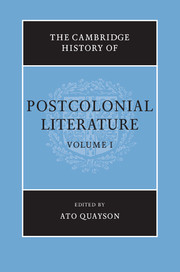Book contents
- Frontmatter
- 1 Introduction: postcolonial literature in a changing historical frame
- 2 Postcolonial fictions of slavery
- 3 Postcolonialism and travel writing
- 4 Missionary writing and postcolonialism
- 5 Postcolonial auto/biography
- 6 Orality and the genres of African postcolonial writing
- 7 Canadian literatures and the postcolonial
- 8 Postcolonialism and Caribbean literature
- 9 Postcolonialism and Arab literature
- 10 Postcolonialism and postcolonial writing in Latin America
- 11 Postcolonial writing in South Africa
- 12 Postcolonial literature in Southeast Asia
- 13 Postcolonial South Asian poetry
- 14 Postcolonial writing in India
- 15 Postcolonial writing in Australia and New Zealand
- 16 Indigenous writing in Canada, Australia and New Zealand
- 17 Postcolonial writing in Ireland
- 18 Postcolonial writing in Britain
- 19 Postcolonial writing in France
- 20 Postcolonial writing in Germany
- References
20 - Postcolonial writing in Germany
Published online by Cambridge University Press: 28 January 2012
- Frontmatter
- 1 Introduction: postcolonial literature in a changing historical frame
- 2 Postcolonial fictions of slavery
- 3 Postcolonialism and travel writing
- 4 Missionary writing and postcolonialism
- 5 Postcolonial auto/biography
- 6 Orality and the genres of African postcolonial writing
- 7 Canadian literatures and the postcolonial
- 8 Postcolonialism and Caribbean literature
- 9 Postcolonialism and Arab literature
- 10 Postcolonialism and postcolonial writing in Latin America
- 11 Postcolonial writing in South Africa
- 12 Postcolonial literature in Southeast Asia
- 13 Postcolonial South Asian poetry
- 14 Postcolonial writing in India
- 15 Postcolonial writing in Australia and New Zealand
- 16 Indigenous writing in Canada, Australia and New Zealand
- 17 Postcolonial writing in Ireland
- 18 Postcolonial writing in Britain
- 19 Postcolonial writing in France
- 20 Postcolonial writing in Germany
- References
Summary
In the strictest sense of the term, Germany is not rich in postcolonial literature, and that is a consequence of its brief colonial history. Though Germans’ ‘colonial fantasies’ stretch back centuries and individual Germans were often involved in voyages of scientific exploration, pursued missionary or commercial activity elsewhere, or participated in other countries’ colonial ventures, state-sponsored German colonialism did not begin until after German unification in 1871. German Chancellor Otto von Bismarck initially opposed German overseas expansion, but in 1884 reversed course and joined Germany’s European rivals in the scramble for Africa. On 24 April 1884 Bismarck proclaimed that the parts of Southwest Africa granted to tobacco merchant Adolf Lüderitz were now under German protection. Despite Bismarck’s explicit instructions to the contrary, colonial explorer Carl Peters soon thereafter declared the coast of East Africa to be a German protectorate. Bismarck himself ordered a German gunboat to secure Togo and Cameroon as protectorates in the summer of 1884, and in the Pacific he mainly claimed areas in which German commercial interests were already active. At the Berlin West Africa (Congo) conference of 1884–5, the European colonial powers confirmed the colonial subdivision of Africa among themselves. By 1885 Germany had acquired its entire colonial empire: four African territories (Southwest Africa, Togo, Cameroon and German East Africa) and several territories in the Pacific (northeastern New Guinea, part of Samoa, the Bismarck, Marshall, Carolina and Mariana Islands, and Kiachow on the Shantung Peninsula in China).
- Type
- Chapter
- Information
- The Cambridge History of Postcolonial Literature , pp. 620 - 648Publisher: Cambridge University PressPrint publication year: 2012
References
- 2
- Cited by

